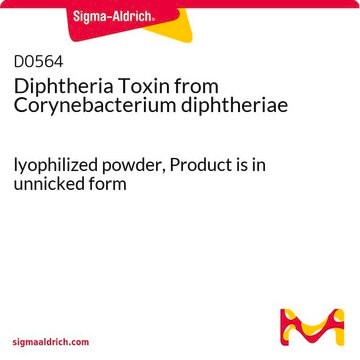O100
Oxotremorine M
solid
Synonyme(s) :
N,N,N,-Trimethyl-4-(2-oxo-1-pyrrolidinyl)-2-butyn-1-ammonium iodide, Oxotremorine methiodide
About This Item
Produits recommandés
Forme
solid
Couleur
white
Solubilité
H2O: 24 mg/mL
ethanol: 4.6 mg/mL
Température de stockage
2-8°C
Chaîne SMILES
[I-].C[N+](C)(C)CC#CCN1CCCC1=O
InChI
1S/C11H19N2O.HI/c1-13(2,3)10-5-4-8-12-9-6-7-11(12)14;/h6-10H2,1-3H3;1H/q+1;/p-1
Clé InChI
VVLMSCJCXMBGDI-UHFFFAOYSA-M
Informations sur le gène
human ... CHRM1(1128) , CHRM2(1129) , CHRM3(1131) , CHRM4(1132) , CHRM5(1133)
Application
- to study its acute effects on the movement of Caenorhabditis elegans
- to treat hippocampal neurons for studying fibroblast growth factor receptor 1 (FGFR1) phosphorylation
- to induce bladder overactivity in rats
Actions biochimiques/physiologiques
Caractéristiques et avantages
Mention d'avertissement
Danger
Mentions de danger
Conseils de prudence
Classification des risques
Acute Tox. 1 Inhalation - Acute Tox. 2 Dermal - Acute Tox. 2 Oral
Code de la classe de stockage
6.1A - Combustible acute toxic Cat. 1 and 2 / very toxic hazardous materials
Classe de danger pour l'eau (WGK)
WGK 3
Point d'éclair (°F)
Not applicable
Point d'éclair (°C)
Not applicable
Équipement de protection individuelle
Eyeshields, Gloves, type N95 (US)
Certificats d'analyse (COA)
Recherchez un Certificats d'analyse (COA) en saisissant le numéro de lot du produit. Les numéros de lot figurent sur l'étiquette du produit après les mots "Lot" ou "Batch".
Déjà en possession de ce produit ?
Retrouvez la documentation relative aux produits que vous avez récemment achetés dans la Bibliothèque de documents.
Les clients ont également consulté
Notre équipe de scientifiques dispose d'une expérience dans tous les secteurs de la recherche, notamment en sciences de la vie, science des matériaux, synthèse chimique, chromatographie, analyse et dans de nombreux autres domaines..
Contacter notre Service technique












